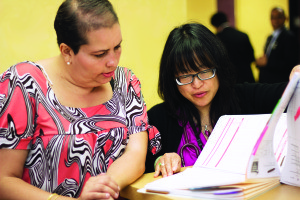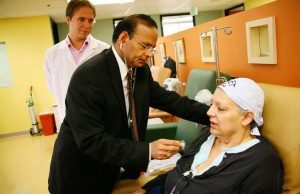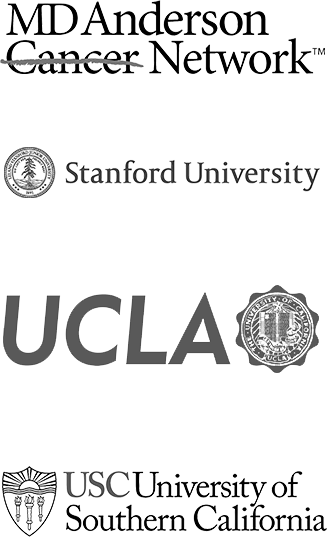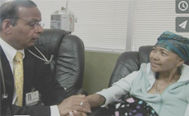Lymphoma
Cancer of the lymphatic system is referred to as lymphoma. Within the lymphatic system are lymph nodes that protect the body from infection by draining waste products and fluid from the bloodstream. When the lymphatic system fights an active infection, it’s normal for lymph nodes in the infected area to become tender and swollen. However, cancerous cells form when white blood cells within the lymphatic system multiply uncontrollably and invade other tissue throughout the body. Lymphatic cancer is a serious issue and it is important a board-certified doctor takes a close look at it.
There are two main types of lymphoma: Hodgkin’s lymphoma and non-Hodgkin’s lymphoma. Please contact the Cancer Center of Southern California to learn more about various types of cancer.

Hodgkin’s Lymphoma
This lymphoma is less common and it is not known what causes the disease. However, there are some risk factors:
- Weak immune system
- Infection with a virus (i.e. Epstein-Barr or HIV)
- Family history of the disease
- Age (common in ages 15 to 35, over 55)
Treatment advances for Hodgkin lymphoma have increased the prognosis for long-term survival of this disease.
The Cancer Center of Southern California is dedicated to fighting cancer through early diagnosis and treatment and implementing a comprehensive multi-disciplinary approach. We encourage patients to participate actively in their medical care so that they can make the best, most informed decisions. Our Los Angeles oncologists have led advanced clinical cancer research and conducted groundbreaking work over the year, and through this research, we have access to the most advanced therapies for our patients.
Non-Hodgkin’s Lymphoma
Non-Hodgkin lymphoma (NHL) is more common than Hodgkin lymphoma with the greatest number of cases occurring in the United States. NHL is more common in men than in women with a risk of developing the disease increasing with age. The disease can start anywhere in the body in a single or group of lymph nodes or in an organ such as the spleen. It is known to spread to the liver and bone marrow.
There are different types of NHL which are grouped in the following categories:
Slow-growing lymphomas – these slowly spread with few symptoms
Fast-growing lymphomas – quickly spread with severe symptoms
Early diagnosis is typically difficult since symptoms may not be noticed until the disease is more advanced; however, knowing family medical history can be a helpful source for diagnosis at an early stage.

Symptoms
Symptoms vary by type of Lymphoma, however there are some common lymphadenopathy symptoms such as:
- Body itching
- Red skin patches
- Painless swelling of one or more lymph nodes
- Symptoms stemming from pressure of swollen lymph nodes on nearby organs or structures. (cough, shortness of breath, nerve pain, swollen leg, abdominal pain or swelling)
- Persistent or intermittent fever (greater than 1020)
- Pain in lymph nodes or abdomen
- Persistent night sweats and/or chills
- Weight loss (10% or more over six months)
- Susceptibility to infections
- Bone pain
Persistent fever, night sweats, chills, and weight loss occur in more advanced or aggressive cases of Hodgkin lymphoma and commonly have a poorer prognosis.
Treatment
 Course of lymphoma treatment depends on tumor size and grade, age, and symptoms. Non-Hodgkins and Hodgkin’s lymphoma are often treated with chemotherapy or radiation. Localized slow-growing lymphoma is typically treated with radiation.
Course of lymphoma treatment depends on tumor size and grade, age, and symptoms. Non-Hodgkins and Hodgkin’s lymphoma are often treated with chemotherapy or radiation. Localized slow-growing lymphoma is typically treated with radiation.
Depending on the lymphoma characteristics, another treatment might be used including:
- Targeted therapy – destroys cancerous lymphatic cells without harming normal cells.
- Stem cell transplant – in cases of NHL recurrence or immediately following high-dose chemotherapy
The Cancer Center treats cancer with a team-oriented approach. We collaborate with prominent surgeons, pathologists, radiologists, and radiation oncologists from prominent institutions such as USC, UCLA, Stanford, M.D. Anderson, St. John’s and Cedars Sinai. The Center develops individualized treatment plans that consider the stage and grade of the tumor, previous treatments (if any), extent of the cancer, biopsy analysis and other unique factors. Our Los Angeles oncologists are worldwide leaders in clinical research trials, and we have access to the most advanced cancer drugs that enable us to exceed standard care whenever needed.
Clinical Trials
Cancer Center physicians are actively involved in clinical trials of the newest drugs and partner with experts for the best treatment plan for each individual for lymph node cancer.
Read more about lymphoma from WebMD.com.
Call the Cancer Center Experts to Learn More
We deeply care about the overall well-being of each and every one of our patients and offer an expert team of Los Angeles oncology specialists for individualized patient treatment. Please contact our center at 310-552-9999 to schedule a lymphoma consultation with one of our physicians.
Next, read about leukemia.



